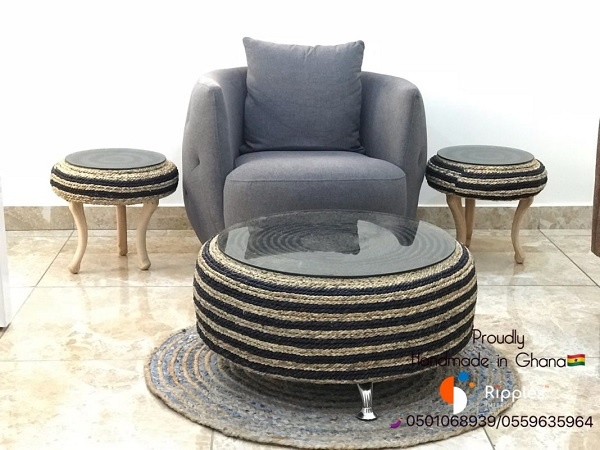The struggles of a man begin at birth said Ola Rotimi in his book ‘The gods are not to blame’. Jeffery is a living example of that proverb and his success-story is one worth reading. For many, the financial difficulties he went through during his education would have ended with them on the streets.
But with determination and hard work, he didn’t give up on his dream. Today, he is the CEO of Ripples Interior Décor. Read how it all started as narrated to the B&FT’s Inspiring Startups.
His life
Jeffery Kwabena Yeboah is a student of the University of Ghana, Legon, studying Information Studies. He is a past student of the St. Peters Senior High School in Nkwatia Kwahu, Eastern Region of Ghana.
He grew up in Nungua, a suburb of Accra – the capital of Ghana, with his father George Yeboah and elder sister, Theresa Yeboah. Life has not been easy for Jeffery, as his father lost his job when he was in class six – a situation that brought hardship on the family.
Because of this situation, Jeffery had to move in with his aunt and her husband, Mr. and Mrs. Agyapong, who financed his education from junior high to senior high. Even, with their help, Jeffery had to engage in some petty trading to support himself in school. He sold iced-kenkey, bread, and fried eggs among others to earn some income.
The situation even worsened after he completed senior high school. There was no money at home to further his education to the tertiary level. But young Jeffery didn’t allow this to overcome him, he decided to take the bull by the horns and enter university – funding his education himself.
When he gained admission at the university of Ghana, he didn’t know how he would complete his education, as no one in his family could support his education. However, ever-determined to make it in life, he went to university with only a little clothing and with the idea of starting a business to support himself.
He started a décor business, wherein he used wallpapers and stickers to decorate rooms for the students. The business was good as the students patronised his services regularly. In fact, with it he was able to get enough money for his food, clothing and shelter on campus – and even pay his fees. That is how the whole idea of Ripples Interior Décor began.
It was this very business that opened the way for his new innovation – car-tyre recycling.
Making centre-tables with car tyres
On one occasion, after he had done an interior décor job for a client outside campus, the client told him he needed a centre-table. So, together with the client, they both set off roaming shops in Accra to get a centre-table. But his client couldn’t really find one he liked. On their way back, Jeffery saw a heap of car-tyres ready for dumping. So, he told his client he wanted to use one of the car-tyres to make a centre-table for him. The idea appeared wild and funny to him and so he laughed at it.
However, he didn’t discourage Jeffery; he told him to try and see the outcome. As determined and creative as he is, he tried his hands on it and the final work impressed him. That was his breakthrough. He became motivated to take it higher and come out with wonderful designs.

Today, a business that he was just trying his hands on as a hobby has grown big. At the least, each month he makes not less than 20 centre- or side-tables which all get sold out. He has currently employed one person, and plans to train and employ others once he gets the space and financial capacity to do so.
His designs are unique among their contemporaries.
Vision
Jeffery has rather big dreams for his business. He wants to take it international and have establishments in other countries across the continent. In the meantime, he wants his products to be found all over Ghana.
“Over the next five years I envision my business in a larger space. I wish to expand in terms of space and machinery. Currently, I operate from a small container and use simple tools in production. So, I am looking forward to reaching a point where I will operate from a larger space with modern machines.
“Again, in the next five years, it’s my goal that I will have branches across Africa creating employment for over 100,000 people across the continent; but it starts with a bigger workshop and showrooms here in Ghana, my motherland. There are a lot of things I can do with car-tyres and people should just watch out.”
His main challenge has to do with space and finances. As a startup that has not had any source of funding aside from his personal savings, he lacks the capacity to expand or even rent a shop.
“The main challenge has got to do with capacity. The shop I have in Madina is very small, which makes it very difficult for me to employ and also store tyres. If I could get a larger space, things would be easier. Again, the cost of transporting tyres from the vulcanisers to the shop is quite high and sometimes limiting. If I could be supported with a truck to convey raw materials, I bet I can do a lot.”
The role of education
For Jeffery, education has been a backbone to his success, hence he is calling on the youth to take it seriously.
“All my life, I have loved and still love schooling. When I was a child, I told my Dad that should he die I might lose everything he has ever worked for, but not the books he had planted in my head. Through education, I have met a lot of people and in a way toned my life to this stage. No one should joke with education. Don’t just go to school, get educated!”

How government can support
Jeffery says government should provide support to startups through funding schemes. He says if government has those schemes readily available without going through a lot of frustrations to get it, startups can have the needed funds to purchase modern machinery and rent bigger spaces for their operations.
Another needed support, he says, is government should sponsor workshops that provide entrepreneurs with the managerial and technical knowledge needed to grow and develop their business.
Then, he adds, government must lead the campaign in promoting made in Ghana goods by purchasing them. By that action, he says, government creates a market for made in Ghana goods.
Advice
“I would like to humbly advise adults to help the youth to explore different avenues to create employment for themselves instead of waiting to be employed by others. The youth should, on the other hand, humble themselves and learn from their predecessors.”
Contact: 055 963 5964
Business News of Friday, 14 December 2018
Source: thebftonline.com













